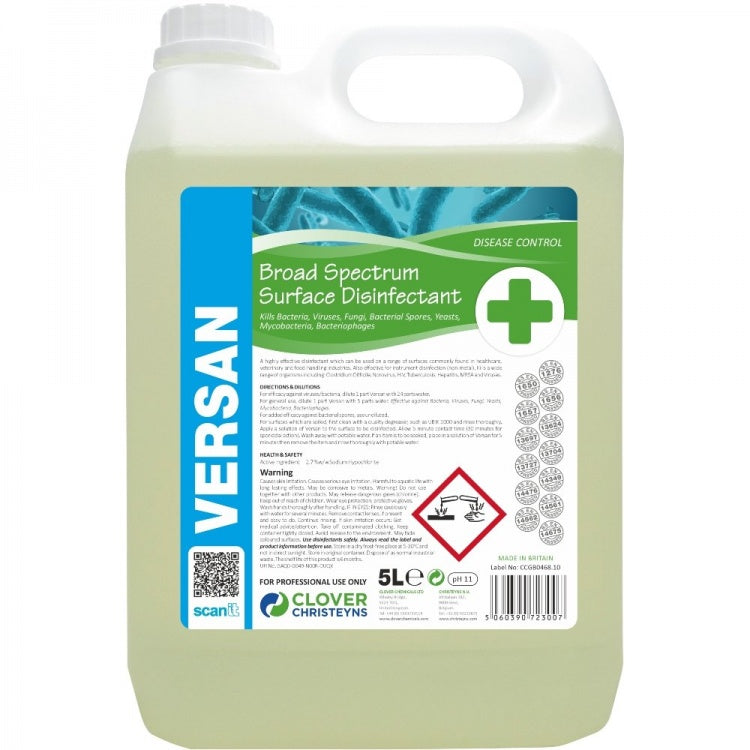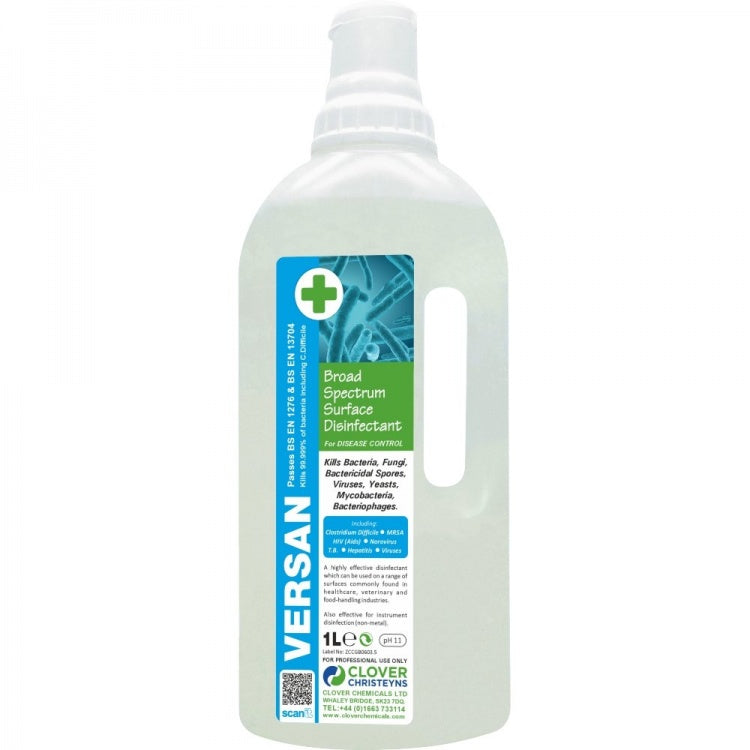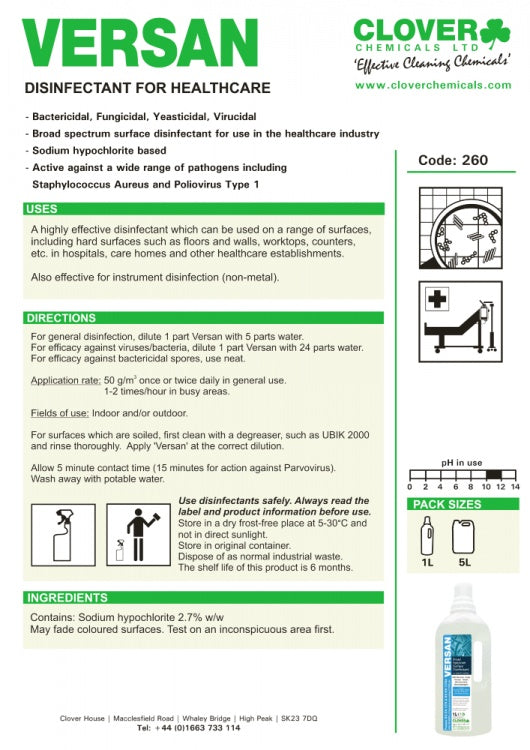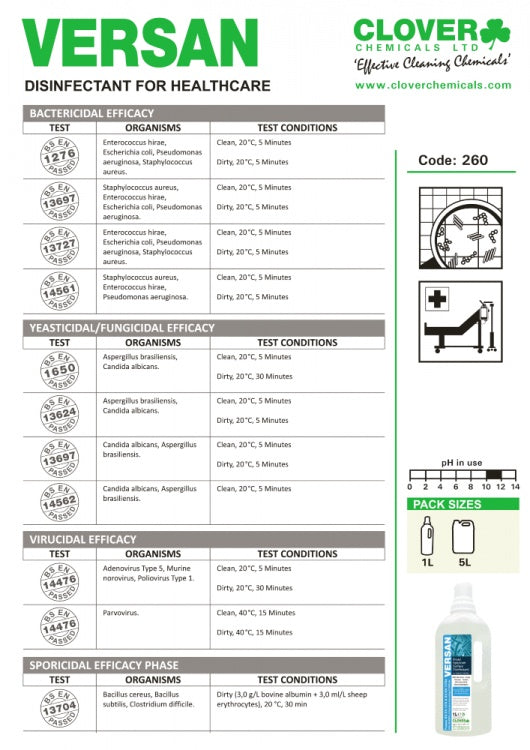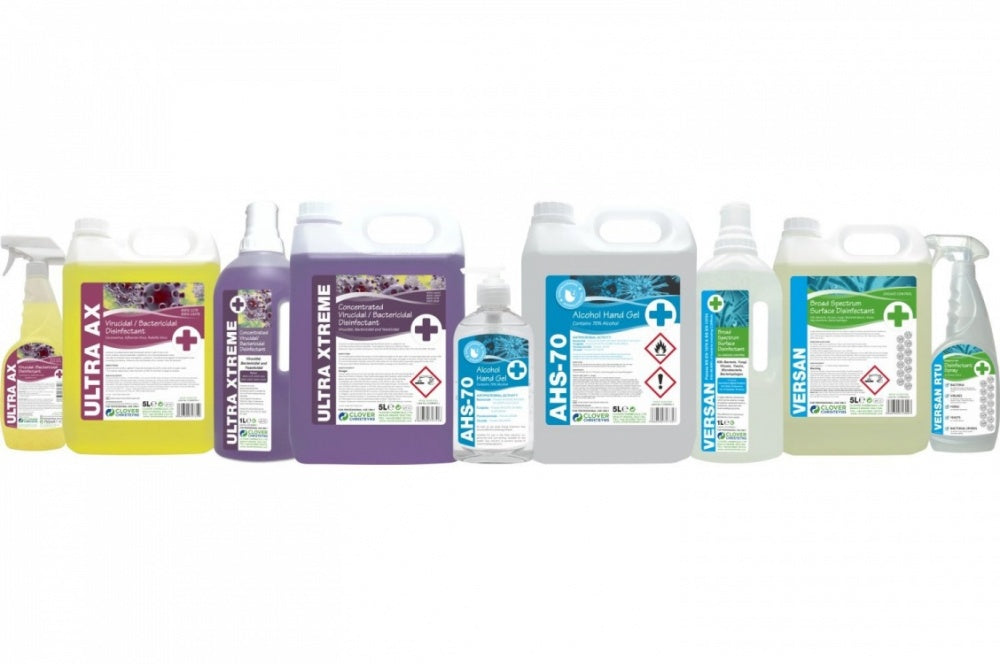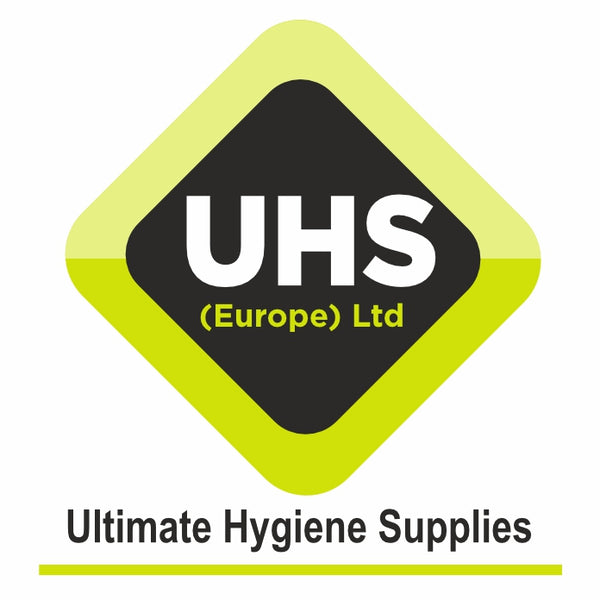Clover Chemicals
Clover Chemicals Versan Virucidal Broad Spectrum Surface Disinfectant (260)
Clover Chemicals Versan Virucidal Broad Spectrum Surface Disinfectant (260)
Couldn't load pickup availability
- Broad spectrum surface disinfectant
- Active against bacteria, fungus, viruses and spores
- Kills 99.99% of bacteria
- Strerilises as well as disinfects
VERSAN Viricidal BROAD SPECTRUM SURFACE DISINFECTANT is a bactericide, fungicide, viricide and sporicide which kills 99.999% of bacteria and is effective against C-Diff, norovirus, HIV/aids, tuberculosis, SARS, hepatitis, herpes, influenza and MRSA. It passes EN1276:1997 and BS-EN13704:2002.
VERSAN is a sodium hypochlorite-based formula which is manufactured for stability, without the common toxic properties of bleach. It sterilises as well as disinfects.
USE IN MEDICAL HYGIENE
VERSAN is suitable for sterilising surfaces contaminated by blood and bodily fluids, and is widely used in mortuaries, road traffic accidents and forensic cleaning applications.
DIRECTIONS FOR USE: Dilute in a plastic container at between 1:4 and 1:24 with water and leave for up to 10 minutes, particularly on heavily bloodied surfaces, before washing away.
USE IN ANIMAL HYGIENE
VERSAN is effective against parvo-virus, feline panlenkopenia and calcivirus, and is widely used on kennel floors and walls, runs and tables.
DIRECTIONS FOR USE: Dilute in a plastic container at between 1:4 and 1:24 with water and leave for 5 minutes before washing away.
USE IN FOOD INDUSTRY
VERSAN can be used on dispensing nozzles, chopping boards, containers and utensils.
DIRECTIONS FOR USE: Dilute in plastic containers at 1:125 with water and leave for 5 minutes before washing away.
What is Versan made of?
Versan is made of an aqueous solution of sodium hypochlorite and 16.5% sodium chloride. Versan is a strength of 2% sodium hypochlorite. Hypochlorites are known to be unstable. Is Versan any different? Yes. The purification process during the manufacture of Versan ensures complete removal of all heavy metal ions, which would normally act as a catalyst to chemically break down many hypochlorites, causing instability. Therefore accurate levels of available chlorine can be obtained with Versan. Hypochlorite is bleach, which is toxic.
Is Versan toxic also?
No. As stated above, toxicity in hypochlorites is due to the by-product of their decomposition, sodium chlorate. With the heavy ions removed Versan decomposes into water and a small amount of sodium chloride (salt). What are the main properties of Versan? Stability.
It is known that Versan can be used as a disinfecting agent, but can it sterilise?
Versan will sterilise as long as the requirements for chemical sterilisation with hypochlorites are carried out. These are: (a) Scrupulous attention to pre-cleansing of the item to be sterilised. (b) Stability of the active agent. (c) That the article to be sterilised is of a material compatible with hypochlorite and is so constructed that it can be cleaned properly. What is the difference between Sterilisation, Disinfection and Antisepsis? Official publications give the following definitions: (ref. Collins, C. H. and Lyne,P. M., 1976) Sterilisation; This is an absolute term meaning complete destruction or removal of all viable micro-organisms. Disinfection; Describes the elimination or destruction of micro-organisms, but not usually bacterial spores. Generally applied to the process of making inanimate objects free from infection and safe to handle. Antisepsis; Destruction of micro-organisms, but not bacterial spores, on skin, mucus membrane or living tissue to prevent sepsis. Versan can be considered in terms of each of these actions depending on the specific situation or application. Therefore a work surface can be wiped over with Milton to disinfect it by killing all 'live' bacteria, but it cannot be sterilised in this way. To sterilise an object it has to be scrupulously cleaned then soaked for the required time in a solution of Versan. This will kill spores.
How long does Versan take to work?
Items are ready for use after just 15 minutes of complete immersion in the Versan solution but can be left soaking for up to 24 hours. Items can be added and removed to and from the solution throughout the day as and when they are needed.
Will Versan have the same effect as bleach on a work surface?
No. Bleaches are usually concentrated to between 5 and 10% and can contain thick detergents to withstand rinsing and flushing. They are dangerous to handle at this concentration. They will leave chemicals behind on the surface which will chemically contaminate and taint food. The bleach may also harm the work surface. Although Versan is less concentrated, it will still have the same germ killing effect as bleach.
Share
